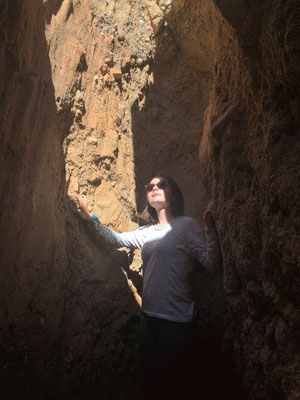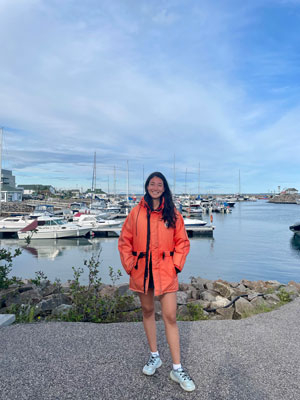Outside of scheduled classes and labs, undergraduate students in the Faculty of Science benefit from an array of opportunities to work directly with McGill’s world-class researchers on projects that enable them to develop practical skills, gain credit towards their degree, and build their own sense of what it means to be a scientist.
Some of the most diverse and exciting of these opportunities are with researchers in the Department of Earth and Planetary Sciences (EPS), where students can be found applying the fundamentals of chemistry, physics, biology and data science to projects that investigate the workings of our planet, our societies, and even the search for life beyond our solar system.
Three McGill students share their experiences to give just a small sample of all there is to discover in the field of earth and planetary sciences.
Émilie Laflèche
B.Sc. (Hons) Planetary Sciences
Émilie Laflèche’s undergraduate research experiences allowed her to apply the geology, mathematics and physics from her coursework to the scientific field she is most passionate about: space.

Laflèche was still in her first year when she plunged into the unfamiliar world of coding, working under the supervision of EPS and physics professor Nicolas Cowan mapping the surface features of simulated exoplanets using reflected light data. With daily support from her supervisor and graduate students in the research team, Laflèche built the confidence to find and fix errors in her Python code. In the process, she developed a deeper familiarity with the research topics at hand and a greater sense of her role in the research process.
“I found it actually quite challenging to learn all of these new topics, and I often dealt with imposter syndrome as a result, which I think is pretty common for a lot of researchers, especially early career researchers,” Laflèche says.
“I would say to anybody who's trying to get involved in research, that is a very normal first step – or even fifth or sixth step – you’re going to feel imposter syndrome at least once. The important thing is to not let it stop you from going after what you want.”
Laflèche’s sense of herself as a scientist continued to evolve during a subsequent undergraduate research experience, working with Catherine Neish, an associate professor in the Department of Earth Sciences at the University of Western Ontario, on lunar impact melt deposits and a project that could inform the search for landing sites for the forthcoming Artemis missions to the Moon. Laflèche’s research culminated in two published abstracts, presented at the Lunar and Planetary Science Conference in March 2021.
Laflèche was first informed of the internship opportunity with Neish by McGill EPS professor Don Baker – as much an example of McGill’s connectedness to the wider research community as it is of the sense of community that characterizes the relatively small EPS department.
“It was really nice to have that specific prof reach out to me knowing that I was ‘the one interested in space’,” says Laflèche, who will embark on her Ph.D. in planetary sciences at Purdue University in the fall.
Julia Morales-Aguirre
B.Sc. Physics, now in her second year of a Masters in Earth and Planetary Sciences
For Julia Morales-Aguirre, getting involved in research as an undergraduate physics major was a “life-changing” experience that inspired her to change direction and pursue graduate studies in seismology.

“I was a physics student for most of my undergraduate career – and then I got really depressed,” Morales-Aguirre recalls. “I decided I needed something that would not lock me in a basement for my entire life.”
“So, I looked into doing a joint major with geophysics – because geologists are known for going outside,” she adds wryly.
The change led to an undergraduate thesis project supervised by EPS professors Yajing Liu and Natalya Gomez, investigating glacial earthquakes in Greenland. These seismic events, which occur when icebergs fall into the ocean as land-based ice sheets deteriorate, offer a unique means to track the rate at which ice is being lost from glaciers. In this emerging field at the intersection of seismology and climate science, there is much work to be done to enhance the methods used to detect these events and understand their relationship to changing climatic conditions.
Morales-Aguirre says the data science aspect of her research work, which involved developing code to pinpoint the signature waveforms of glacial earthquakes, set it apart from the math-heavy theoretical underpinnings of seismology. But of even greater value than the technical skills she acquired, she says research taught her to adopt a “philosophical approach”, based on teamwork and a persistent, curiosity-driven pursuit of open-ended scientific questions.
“Success is definitely not a straightforward path. You kind of learn to debug yourself at some point and not so much rely on someone telling you the answer – because there is no answer. That’s quite different from what you usually do as an undergrad in all your classes: you have a problem, you have an answer that you’re supposed to get to, whereas research really does not have any answers most of the time.”
Describing her transition from a physics undergrad who had “pretty much given up on the idea of graduate school” to an emerging researcher who is now looking at starting a Ph.D. in 2022, Morales-Aguirre underscores the support she received from her supervisors, Liu and Gomez, and the value placed on diversity and inclusion within the EPS department.
“Research opportunities [in EPS] are not solely based on your GPA, but also your potential and your interest,” she says. “I think that was what really shocked me about coming into this department – how willing they were to work with you and to include you. Just because you had a different background or a different life story, it didn’t really matter in terms of [what they saw in] you as a potential scientist, and how much you could bring to the community. I really appreciated that.”
Shirley Xu
3rd year B.A. & Sc. student, majoring in biology and economics
When Shirley Xu attended a student-faculty networking event organized by the Student Research Initiative – a student-led group that connects McGill undergraduates with research opportunities – she was intrigued by the diversity of academic disciplines represented in a research group led by EPS professor Eric Galbraith.

“I was curious and wanted to check out his lab because of how transdisciplinary it is,” she says. “The backgrounds of students [in the lab] include people from biology, but also anthropology and computer science and earth and planetary science.”
A five-minute conversation with Galbraith led Xu to an undergraduate research opportunity working on the Human Chronome Project, an analysis of what people around the world spend their time doing each day and the impact that has on our environment and our well-being. By developing a detailed picture of how people allocate their time, the researchers aim to draw insights that could help orient policymakers towards more sustainable practices and improved social well-being.
“The project really nicely puts together my interests in the sciences and economics,” Xu says. “It’s about linking the earth system to humans and the way our society functions.”
As a bonus, Xu has gained exposure to other languages and cultures by virtue of working with time-use survey data from around the world. At first, her work focused on India; then, with the support of an NSERC Undergraduate Student Research Award, she went on to work on data from Russia, Mongolia and a number of countries in Latin America, developing a working knowledge of Spanish along the way.
Outside McGill, Xu has found an excellent complement to her research experience in a part-time job collecting census data for Statistics Canada. Going door-to-door, Xu has encountered varying degrees of willingness or reluctance to share personal information. She says this first-hand experience of the data collection process has given her insight into how biases and misrepresentations can find their way into the kind of data she is analyzing in her research work.
Xu’s advice to other students looking to get involved in research: be willing to explore, take the time to go to networking events, and don’t be afraid to pursue opportunities that might not appear to be an exact fit with what you are studying.
“The opportunities are out there if you just stay curious, try to explore and not be too stressed about it. The opportunity will come to you if you look for it.”
